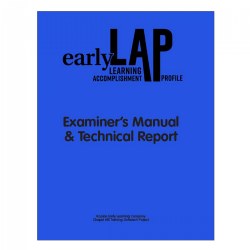Assessments & Evaluations
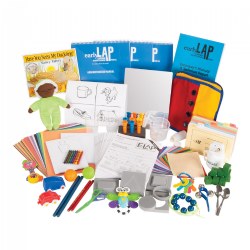
Early Learning Accomplishment Profile - E-LAP™ - Kit
Item: 13649
Status: In Stock
$379.95
Birth - 36 months. A criterion-referenced instrument measuring development in 6 domains. E-LAP™ is appropriate for all children, including those with disabilities. The instrument is excellent for Early Head Start Programs and effective for communicating and collaborating with parents about their children's progress. Includes scoring sheets appropriate for summarizing results 3 times each year. Kit includes materials necessary for assessing 20 children. Additional manuals and scoring books available. Contents may vary.
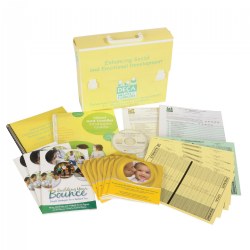
DECA Early Childhood Assessment for Infants/Toddlers - DECA-I/T - Kit
Item: 16139
Status: In Stock
$229.95
The Devereux Early Childhood Assessment for Infants and Toddlers is a premier tool for assessing protective factors and screening for potential risks in the social and emotional development of very young children. It includes 50 record forms (20 Infant and 30 Toddler), Strategies Guide, User Guide, Set of 5 reproducible Parent Teacher Masters, 20 Parent Strategy Guides (For Now & Forever), 3 Adult Resilience Journals (Building Your Bounce) and Forms CD. This assessment is standardized, norm-referenced,… More »

DECA-I/T Infant Record Forms
Item: 13844P
Status: In Stock
$19.95
For use with DECA-IT kit for children ages 1 month up to 18 months. Available in English or Spanish. Set of 20.
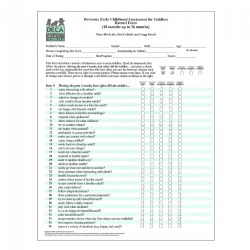
DECA-I/T Toddler Record Forms
Item: 13845P
Status: In Stock
$29.95
For use with DECA-IT kit for children ages 18 months up to 36 months. Set of 30.
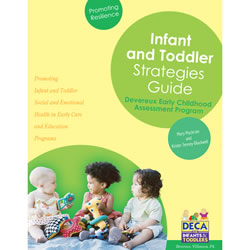
DECA-I/T Strategies Guide
Item: 16138
Status: In Stock
$49.95
This guide provides research-based, simple, easy-to-use social and emotional strategies for the home and childcare setting. With hundreds of strategies, organized into five chapters, this guide is a wonderful reference for any caregiver who is interested in promoting the social and emotional health of infants and toddlers.
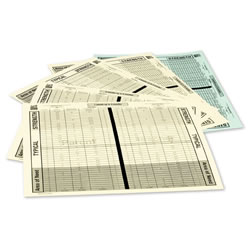
DECA-I/T Parent/Teacher Profile Masters - Set of 5
Item: 14016
Status: In Stock
$12.95
For use with DECA-IT kit. Includes 4 infant and 1 toddler parent/teacher profile masters.

DECA-P2 Record Forms
Item: 29025P
Status: In Stock
$39.95
The DECA-P2 Record Forms are strength-based, nationally standardized, reliable, valid, and easy-to-use! These sets includes 40 assessment forms and a pad of 40 individual child profile forms. Sets available in English or Spanish.

Promoting Resilience For Now and Forever - Preschool, 2nd Edition - Set of 20
Item: 26173P
Status: In Stock
$32.95
These guides offer families simple strategies to support young children's healthy social and emotional development. Filled with suggestions of everyday activities that families can enjoy together and promote three key protective factors: initiative, self-regulation, and attachment/relationships. Booklets (40 pages) are available in English or Spanish in sets of 20. Copyright 2013.
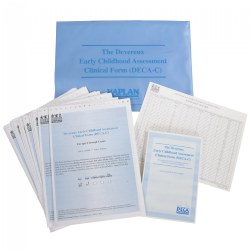
Devereux Early Childhood Assessment Clinical - DECA-C - Kit
Item: 98817
Status: In Stock
$149.95
The Devereux Early Childhood Assessment Clinical Form (DECA-C) is designed to be used by early childhood mental health consultants and other mental health professionals with select children, ages 2 through 5, who are already showing significant behavioral concerns. The DECA-C is a 62-item scale that can be completed by either teachers or parents in about 15 minutes. The DECA-C contains all of the strength-based resilience items and scales found on the Devereux Early Childhood Assessment for Preschoolers,… More »
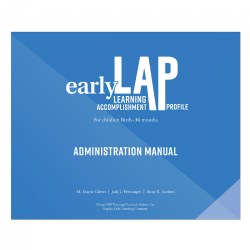
E-LAP™ Administration Manual - 3rd Edition
Item: 8203
Status: In Stock
$17.95
Includes a list of materials, instruction for administering individual items, a summary page, an IFSP form, and a profile page. © 2001
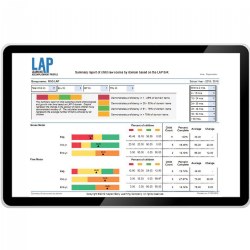
Online LAP™ Assessment Software
Item: 24526P
Status: Ships From Manufacturer
$0.50 - $16.95
Based on the Learning Accomplishment Profile assessment system, LAP™ Software is a web-based software product designed to help collect and document child progress, produce child and aggregate reports, provide information for individualized instruction, and meet accountability requirements. The diagnostic assessment works with LAP™-D™, 3rd edition, a norm-referenced assessment tool for observing the development of children in the 30 to 72 month age range. The ongoing assessment… More »

e-DECA Assessment & Planning System 2.0
Item: 16701P
Status: In Stock
$1.00 - $299.95
E-DECA is the web-based application in which all Devereux Early Childhood Assessments can be entered online by both teachers and parents. The e-DECA completes all scoring, generates reports, suggests research-based strategies for both school and home settings, and stores your data in a secure database. Select to receive research-based strategies that support the Conscious Discipline methodology OR that align with the Head Start Learning Outcomes Framework. Features: score record forms quickly and… More »
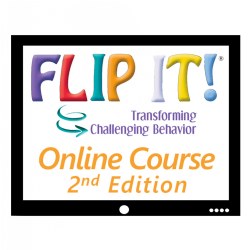
FLIP IT!® Online Course - 2nd Edition
Item: 90146
Status: Ships From Manufacturer
$30.00
Want to learn to FLIP IT, but can't make it to a training? No problem! Learn to FLIP IT at your own pace and on your own time by choosing the FLIP IT!® Online Course, 2nd Edition. The entire length of the course is approximately 2.5 hours including interaction, reflection, application of skills learned with FLIP IT and a final assessment. Most importantly, this course can be taken module by module and not all in one sitting. Empower yourself and your colleagues by purchasing this course today!… More »
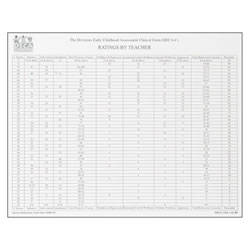
DECA-C Norms Reference Card
Item: 98816
Status: In Stock
$6.95
The Norms Reference Card shows the ratings by teacher on one side and the ratings by parent on the other side for easy comparison. T-scores, Initiative, Self-Control, Attachment, Total Protective Factors, Withdrawal/Depression, Emotional Control Problems, Attention Problems, Aggression, Total Behavioral Concerns and Percentile are the areas reviewed on the card.
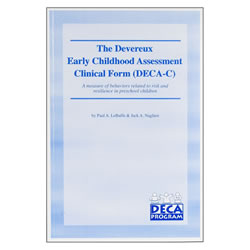
DECA-C Manual
Item: 98814
Status: In Stock
$54.95
Authored by Paul A. LeBuffe and Jack A. Naglieri, this manual provides essential information on the development, administration, scoring, interpretations, and utilizations of DECA-C results in assessment, eligibility determinations, intervention planning and outcome evaluation. Chapters: Introduction; Development and Standardization; Psychometric Properties; Administration and Scoring; Interpretation; The Use of the DECA and DECA-C within the Early Childhood Mental Health Consultation Model. Copyright… More »
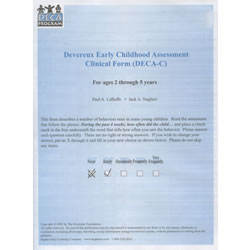
DECA-C Record Forms - 30 Forms
Item: 98813
Status: In Stock
$59.95
The Devereux Early Childhood Assessment Clinical Form (DECA-C) is designed to be used by early childhood mental health consultants and other mental health professionals with select children, ages 2 through 5, who are already showing significant behavioral concerns. The DECA-C contains all of the strength-based resilience items and scales found on the Devereux Early Childhood Assessment for Preschoolers, 2nd Edition (DECA-P2), but also assesses social and emotional concerns, including: aggression,… More »

All About the ITERS-R™ Set
Item: 50034
Status: In Stock
$71.95
Save when you purchase the All About the ITERS-R™ and the ITERS-R™ spiral edition.

E-LAP™ Scoring Booklets - 20 - English
Item: 16296
Status: In Stock
$22.95
To be used in conjunction with the E-LAP™ kit. Scoring sheets are appropriate for training a child's progress three times a year. Set of 20.
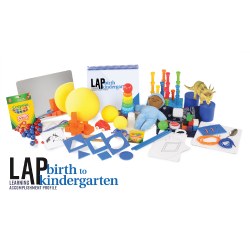
LAP™ Birth to Kindergarten Kit
Item: 94172
Status: In Stock
$499.95
This kit contains a standardized set of materials to facilitate administration of the Learning Accomplishment Profile: Birth to Kindergarten (LAP™ B-K) assessment. A subscription to the Online LAP™ platform is required to administer and score items in the LAP™ B-K assessment.
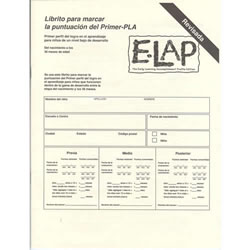
E-LAP™ Scoring Booklets - 20 - Spanish
Item: 89194
Status: In Stock
$23.95
Spanish version includes a list of materials, instruction for administering individual items, a summary page, an IFSP form, and a profile page. Set of 20.

